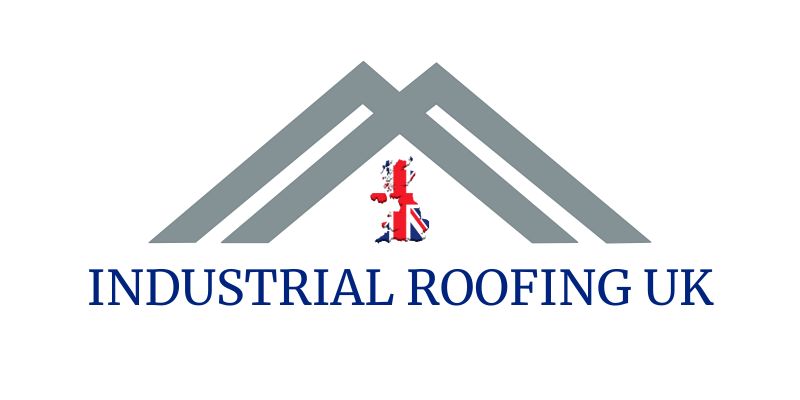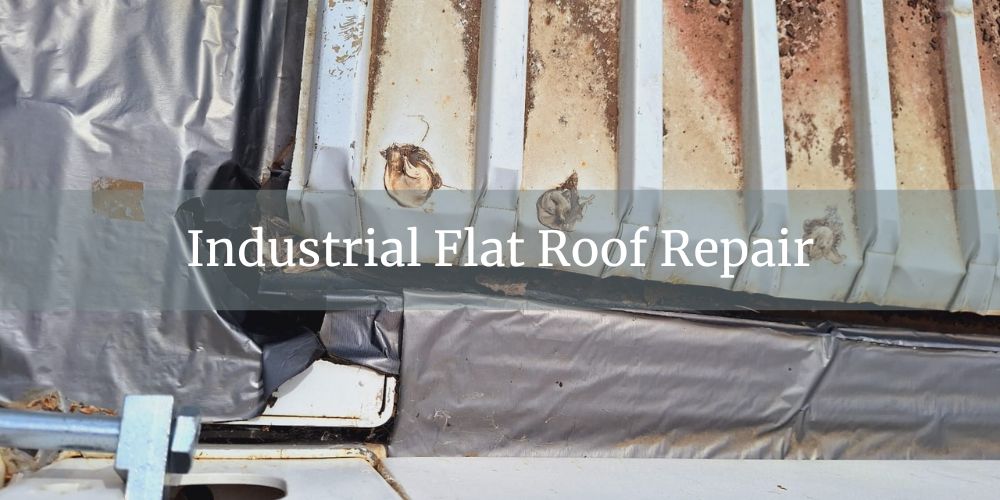Industrial flat roof repair refers to the process of fixing issues on flat roofing systems in industrial buildings. This involves addressing problems specific to metal roofing, such as cut edge corrosion, rusted fixings, and panel deterioration to restore the roof's functionality and prevent further degradation. Effective repairs ensure the roof remains waterproof and structurally sound, protecting the building's interior and operations. Regular upkeep and timely interventions are essential to extend the roof's lifespan and maintain its performance, ensuring the building remains secure and efficient for all industrial activities.
Industrial Roofing UK offer expert industrial flat roof repair services across the UK, helping businesses maintain watertight protection and operational continuity. We address common flat roof issues such as membrane damage, ponding water, failed joints, and surface deterioration using high-performance repair systems suited to industrial environments. Our responsive team delivers fast, effective repairs with minimal disruption, whether dealing with emergency leaks or planned maintenance. Serving factories, warehouses, and processing facilities nationwide, we focus on restoring integrity, extending roof lifespan, and ensuring full compliance with health and safety standards.
What Is Industrial Flat Roof Repair?
Industrial flat roof repair for metal panels involves addressing issues such as leaks, corrosion, and structural damage on flat roofing systems in industrial buildings like factories, warehouses, and manufacturing facilities. These repairs focus on restoring the integrity of metal panels, which are prone to cut edge corrosion and other environmental damage. According to the National Federation of Roofing Contractors (NFRC), timely repairs are essential to prevent minor issues from escalating into significant problems, potentially compromising the roof's performance.
Effective repair of industrial flat metal roofs not only restores functionality but also extends the roof's lifespan. Regular maintenance and prompt attention to damage can increase the longevity of these roofing systems by up to 40%, as highlighted by the Building Research Establishment (BRE). Common repair tasks include sealing leaks, treating rust, and reinforcing weak areas to ensure the roof remains watertight and structurally sound. Investing in professional repair services allows industrial facility managers to protect their buildings from potential damage and costly future repairs, ensuring the overall efficiency and safety of their operations.
Have a question about an upcoming project?
What Are The Most Common Industrial Flat Roof Repairs?
The most common industrial flat roof repairs are; patch repairs, cut edge corrosion treatment, seam and joint repairs, replacing damaged panels, and applying liquid-applied membranes. Flat metal industrial roofs share many repair needs with other types of metal roofs but often require specific approaches due to their unique flat structure, which can make drainage and water pooling more problematic.
- Patch Repairs
- Cut Edge Corrosion Treatment
- Seam and Joint Repairs
- Replacing Damaged Panels
- Application of Liquid-Applied Membranes
1. Patch Repairs
Patch repairs are frequently needed to address small areas of damage on industrial flat roofs. These repairs typically involve applying a metal patch or a compatible material over punctures or tears in the roofing membrane. This method is essential for preventing water ingress and further deterioration. According to the National Federation of Roofing Contractors (NFRC), using high-quality patching materials matching the existing roof can extend the roof's lifespan significantly.
2. Cut Edge Corrosion Treatment
Industrial flat roofing which uses a metal panel system are particularly vulnerable to cut edge corrosion, which occurs when the protective coating wears away, exposing the metal to moisture and air, leading to rust. Treating cut edge corrosion involves cleaning the affected area, applying a rust-inhibitive primer, and sealing it with a durable coating. This process is crucial for preventing leaks and maintaining the structural integrity of the roof. The Building Research Establishment (BRE) suggests regular treatment of cut edge corrosion to prevent extensive damage and prolong the roof's life.
3. Seam and Joint Repairs
Seams and joints on industrial flat roofs can become compromised over time due to thermal expansion, contraction, and weathering. Repairing these areas typically involves resealing the seams with high-quality sealants or liquid-applied membranes to ensure they remain watertight. Properly maintaining seams and joints is vital to prevent leaks and water damage. According to industry experts, regular inspection and timely repair of seams can prevent up to 90% of leak-related issues in metal roofing systems.
4. Replacing Damaged Panels
In some cases, individual metal panels on an industrial flat roof may be too damaged to repair and will need to be replaced entirely. This involves removing the damaged panel and installing a new one, ensuring it is properly aligned and sealed to integrate seamlessly with the existing roofing system. Replacing damaged panels is crucial for maintaining the roof's overall strength and weather resistance.
5. Application of Liquid-Applied Membranes
Applying liquid-applied membranes is a common repair method for industrial flat roofs. These membranes, such as polyurethane or silicone, provide a seamless, waterproof barrier that can cover large areas of the roof. They are particularly effective for addressing widespread issues like surface wear, minor cracks, and leaks. Liquid-applied membranes offer flexibility and durability, making them ideal for metal roofs subjected to thermal movements and environmental stressors.
What Are The Biggest Potential Issues With An Industrial Flat Roof?
The biggest potential issues with an industrial flat roof include water pooling, membrane damage, thermal expansion, improper installation or maintenance, corrosion, and structural load. These problems can compromise the roof's integrity and functionality, leading to leaks and structural problems. Effective industrial flat roof repair strategies are essential to address these issues promptly and maintain the roof's performance.
1. Water Pooling
Water pooling, or ponding, occurs when water fails to drain correctly and accumulates on the roof's surface. Flat roofs are prone to standing water due to their minimal slope, and over time, this stagnant water can lead to leaks, structural damage, and promote the growth of mold and mildew. According to the National Roofing Contractors Association (NRCA), proper drainage systems and regular maintenance are essential to prevent water pooling and its associated issues. Addressing water pooling often requires industrial flat roof repairs such as installing additional drainage outlets and regrading the roof surface to ensure effective water flow.
2. Membrane Damage
Membrane damage involves the degradation of the waterproof layer designed to prevent water infiltration. This damage can result from various factors, including physical wear and tear, extreme weather conditions, and UV radiation. Punctures, tears, and blisters in the membrane can compromise its integrity, leading to leaks and further damage. The Building Research Establishment (BRE) emphasises the importance of using high-quality, durable materials and conducting regular inspections to identify and repair membrane damage promptly. Effective industrial flat roof repairs for membrane damage include applying liquid coatings to seal and protect the affected areas.
3. Thermal Expansion
Thermal expansion affects industrial flat roofs, particularly those using metal panels, as they expand and contract due to temperature fluctuations. This movement can cause the roofing materials to shift, leading to gaps, cracks, and compromised seals. Over time, these issues can result in leaks and structural weaknesses. Using materials designed to accommodate thermal expansion and ensuring proper installation can help mitigate these risks. Addressing issues caused by thermal expansion often involves industrial flat roof repairs such as resealing joints and replacing damaged panels.
4. Improper Installation or Maintenance
Improper installation or lack of regular maintenance can exacerbate existing issues and lead to new problems in industrial flat roofs. Poorly installed roofs may have inadequate seals, insufficient insulation, or improper drainage systems, all of which can contribute to leaks and reduced lifespan. The NRCA recommends hiring experienced, certified professionals for installation and scheduling regular maintenance checks to ensure the roof remains in optimal condition. Industrial flat roof repairs in these cases might include correcting installation errors and performing thorough maintenance to address and prevent damage.
5. Corrosion
Corrosion is the degradation of metal surfaces due to chemical reactions with environmental elements, such as moisture and pollutants. This is a significant concern for metal industrial flat roofs, especially at the cut edges where protective coatings may be compromised. Corrosion can weaken the metal panels, leading to leaks and structural damage. Using corrosion-resistant materials and applying protective coatings can help prevent this issue. The BRE highlights the importance of regular inspections and maintenance to address any signs of corrosion early. Corrosion often necessitates industrial flat roof repairs such as cut edge corrosion treatment and the application of protective coatings to restore and protect the metal panels.
6. Structural Load
Structural load refers to the ability of industrial flat roofs to support heavy equipment such as HVAC systems, solar panels, and other machinery. Ensuring the roof can bear these loads without compromising its structural integrity is crucial. Overloading the roof can lead to sagging, cracks, and potential collapse. Proper design and engineering, along with regular structural assessments, are vital to maintaining the safety and functionality of the roof. Addressing issues related to structural load might involve industrial flat roof repairs such as reinforcing the roof structure and redistributing the weight of installed equipment to prevent damage.
How Much Does Industrial Flat Roof Repair Cost?
Industrial flat roof repair typically costs between £450 and £740, depending on the severity of the damage and the specific repair techniques required. Common repair methods include patching leaks, treating cut edge corrosion, and applying waterproof coatings. The cost can vary based on factors such as the size of the roof, the extent of the repairs needed, and the type of materials used. Ensuring regular maintenance and prompt repair can prevent more extensive and costly issues in the future.
| Service | Cost Range |
|---|---|
| Industrial Flat Roof Repairs | £450 to £740 |
| Industrial Flat Roof Leak Repair | £450 to £650 |
| Industrial Flat Roof Restoration | £48 to £87 per sqm |
| Industrial Flat Roof Waterproofing | £48 to £110 per sqm |
| Industrial Flat Roof Refurbishment | £46 to £127 per sqm |
| Industrial Flat Roof Recoating | £48 to £92 per sqm |
| Industrial Flat Roof Coatings | £46 to £88 per sqm |
| Cut Edge Corrosion Treatment | £55 to £124 per L/M |
*These estimates are general and actual costs can vary based on specific project requirements, location, and market conditions.


